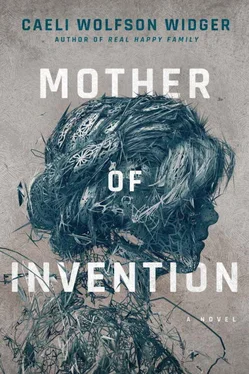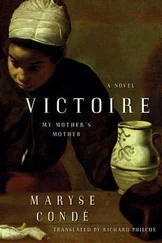“Oh? How’s the Trial?”
The question came too casually; he could have been asking her about a meal.
“Successful. Not without its challenges, but a net positive so far.” She’d planned to tell him everything—about her frustrations with Luke and the INR-View and Gwen Harris’s difficult personality, but something held her back.
“I’m sure it’ll be a huge hit,” said Peter. “You’ll probably be exponentially more famous by the time I get back.”
“That’s not a part of it,” said Tessa, irritated. “But I do think we’re on the way to making some breakthroughs that are going to have a major impact.”
“Of course you are,” said Peter. “I’m so proud. Oh, sorry, hang on.”
Tessa heard a windy sound in the phone and muffled voices in the background.
“Sorry, honey, I have to get going. We have limited daylight until we have to make camp.”
“Text me with your return date,” said Tessa, her throat suddenly tightening. She didn’t want to hang up yet. “You’ll come straight up to the Center when you’re back, right?”
“Of course,” said Peter.
“I love you,” said Tessa.
“Love you, too,” said Peter. Static rasped the connection, and then he was gone.
At dinner with the Cohort that evening, Tessa had planned to lighten the mood. Gwen’s concern over her baby’s lack of movement had created an air of mild anxiety among the group, and Tessa wanted to change it. Part of her job was to keep the group optimistic and in good spirits. She’d planned to ask each of the women to share a story about her childhood; they’d spoken little of the distant past.
But when the four of them had settled around the table with poached salmon over asparagus risotto, Tessa found she wasn’t in the mood to facilitate conversation. Her phone call with Peter had left her out of sorts. She took a bite of fish; it was delicious, like all the meals served during the Trial.
“How’s Peter, Tessa?” said Kate, out of nowhere. “You haven’t mentioned him lately.” As if she’d read Tessa’s mind.
“It’s interesting you ask,” said Tessa. “I just spoke to him this afternoon. He’s having a very intense experience hiking the Pacific Crest Trail.”
“Don’t you get tired of people saying things are intense ?” said Gwen. “It’s right up there with amazing .”
Tessa couldn’t help laughing. “You’re right. But I think he’s sincere. He finds a lot of… meaning in nature. He’s always loved to hike and ride his bike in the mountains.”
“Do you?” asked LaTonya. “Find meaning in nature? Because no offense, but nature sort of bores the shit out of me. I mean, I love a pretty beach as much as the next person, but I’m more indoorsy.”
“Honestly”—Tessa took a sip of sparkling water—“no. I’m not especially drawn to the natural world.”
“What are you drawn to?” asked Gwen. “Where does Tessa Callahan find her sources of meaning?”
“Well,” said Tessa. “In people, I suppose. And in ideas.”
“What about something more concrete?” said Gwen.
“You’re tough, Gwen,” said Kate.
“In this .” Tessa gestured around the room. “In the concrete manifestations of ideas.”
“Pretty lofty,” said Gwen. “I was thinking more of like a hobby.”
“I wish,” said Tessa. “I haven’t found time for hobbies.”
“Me neither,” said Kate. “I read and watch TV and that’s it. God, I’m so boring. But there never seems to be time.”
“Have you noticed men always do, though?” LaTonya said. “No matter how busy they are, they always find time for their extracurriculars. Their video games, their sports, their collections.”
Kate nodded. “Zimmerman hunts, doesn’t he? And teaches himself Mandarin.”
“Luke? Yes,” said Tessa. “I mean, he only hunts nuisance populations that he can eat nose to tail. Deer and rabbit, I think. I don’t know how far the Mandarin went, but he does kite surf quite a bit.”
“Whatever the fuck that is,” said LaTonya.
“Or maybe it’s Ultimate Frisbee now,” said Tessa. “Plus some competitive chess.”
“But no girlfriend,” said LaTonya.
“Or boyfriend,” said Gwen.
“Neither,” said Tessa. “His behavior is conventionally gendered. Externally facing. Action-oriented. Lower emphasis on relationships.”
“I feel sorry for men,” said Gwen. “And coming from a lesbian who doesn’t particularly like them, that’s saying a lot.”
“Why sorry?” said Kate. “My ex-husband and his buddies are the luckiest people on earth. They do whatever the hell they want, pretty much all the time, with zero guilt. That includes hobbies and plenty of sex.”
“Bitter much?” said LaTonya.
“Maybe,” said Kate. “But I definitely don’t feel sorry for him.”
“They’re just always searching,” Gwen went on. “I actually think that conventional gender model you mentioned is pretty accurate for most men. It’s not their fault. It’s all because they can’t get pregnant.”
“What do you mean?” asked Tessa.
“Well, pregnancy and motherhood are universally acknowledged as accomplishments. As big milestones in a woman’s life.”
“Not in half of Africa,” said LaTonya.
“Fine. Let’s talk about the United States. No matter how empowered women are, no matter how badass their careers are, no matter how much money they make, those things are second-tier achievements.”
“What?” Tessa said, startled. “Second tier?”
“Yes,” said Gwen. “Motherhood is the first tier. I don’t care if it sounds outrageous. You know it’s true. A woman without a career is considered weird, sure, but secretly, most people think a woman without children is weirder.”
“That’s insane,” said Kate. “That’s not true at all.”
“Actually, voluntary childlessness has held a steady percentage in the United States—around six percent—for the last twenty years,” said Tessa. “But that’s not to say I agree with you, Gwen.”
“Let me put it another way,” said Gwen, sounding more enthused than Tessa could remember hearing her. “The achievement”—she air-quoted the word—“of motherhood is available to most women. Some are infertile, sure, but most aren’t. And once you’ve had a baby, you are a legitimate woman in this society.”
“Bullshit,” said LaTonya. “You need money. You need to join a certain class. Ideally you should be white. Straight. Et cetera. You’re sounding sort of crazy, Gwen, and I—”
“I completely agree with you,” said Gwen. “But those factors are separate from my point. All I’m saying is, most women are biologically, inherently equipped to succeed at growing another human being inside themselves, and then releasing it out into the world. Almost no one, except people who are mean or lying to themselves, doesn’t think that’s a cool, respectable thing to be able to do.”
“Whereas men don’t have that preprogrammed power,” said Tessa.
“Exactly,” said Gwen. “They have to start from scratch. They have to prove their worth by starting wars and making money and creating companies and…”
“Hiking extreme mountain trails,” said LaTonya, patting Tessa on the arm, and everyone laughed.
“All I’m saying is,” said Gwen, “women are born with a superpower. Men aren’t as lucky.”
“To our superpower,” said LaTonya lightly, raising her water glass. Gwen and Kate lifted theirs and clinked. Tessa did not. She felt anger creeping through her like an allergic reaction.
“Fatherhood is profound,” said Tessa. “You can’t dismiss it.”
Читать дальше













